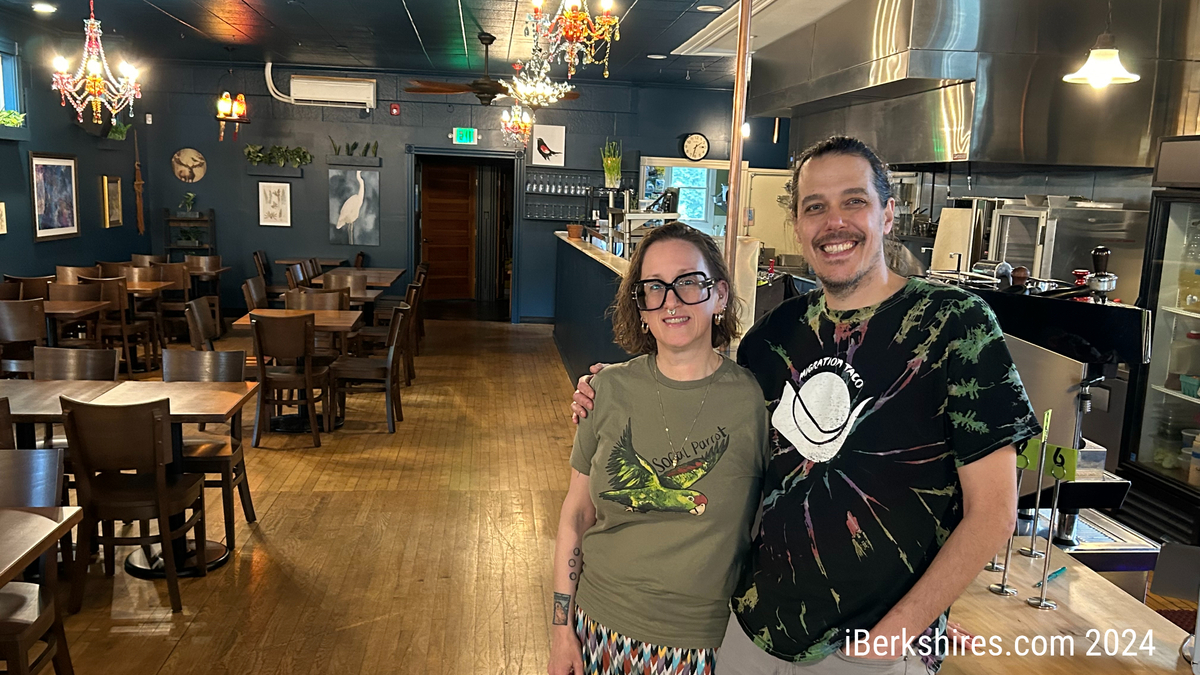
Vegan Restaurateurs Offer North County New Options

Above, a cold Lithuanian beet soup featured on the website of North Adams' Wish Tree; below, a green curry made with fava beans, cubanelle pepper, bamboo shoot and basil and served with jasmine rice.

"Denver needed good vegan tacos," Rackauskas said, referring to the Colorado city she and Dinsmore called home at the time. "We felt a need."
"So, our youngest son has a lot of allergies," Dinsmore picks up the story. "[Rackauskas] was a vegetarian before, and because [their son] has a milk allergy and an egg allergy and, for ethical reasons, everyone in our family became vegan.
"I was the last one to join them, which was like the day before we opened the taco truck."
That business, dubbed Migration Taco, later migrated itself from Denver to southern Arizona and, finally, to the Steeple City, where Rackauskas and Dinsmore established a new base of operations for the mobile eatery in 2023.
This year, the family took on a new challenge, purchasing the historic West End Market building at 437 West Main St. and opening the city's first vegan restaurant, Wish Tree.
The journey that began in 2019 has confirmed both the need for vegan dining options and the ability of Dinsmore and Rackauskas to fill that void.
"We would go out to eat, and there were a lot of places we'd go to, and I always felt let down," Dinsmore said. "I thought, 'We could do this better.'
"So our idea was, we're going to be able to do this because we know what we want to eat, so let's do it. And we were doing great. … The week before COVID hit [March 2020], we hired somebody, and we had our busiest weekend ever [with the truck], and it was March. I'm like, 'Why are we so busy in March? It's the cold season.' And I was like, 'Alright, this is great.'
"And then everything just fell off from there."
They tried to run the food truck as a delivery-based business at the height of the pandemic, but ultimately decided that running a food truck parked in front of their house 24/7 was not for them. Their next move was to get out of the city and into the wilds of southeast Arizona, near the New Mexico border.
But that was a little too isolated.
"We were there for almost three years," Rackauskas said. "And we worked the truck there, too, in the middle of rural cattle country. And that was fun. But it was really the middle of nowhere, as in an hour to the nearest grocery store and its Walmart. And getting anything done — you had to go to Tucson for supplies, and that's five hours round trip driving. So that was a lot."
Enough to make the bucolic Berkshires seem downright cosmopolitan in comparison.
"We have friends here," Dinsmore said. "I was out here to visit them."
"They kind of sold us on it," Rackauskas said. "We were thinking Vermont, and they were like, 'Oh, check out North Adams.' … I had never been to Massachusetts until the day we drove up to the house we bought without ever seeing it."
But the pair is used to taking big leaps — from giving up their day jobs to pursue a passion for vegan food to crisscrossing the country with a food truck to opening a business in a notoriously difficult field like hospitality without much formal restaurant experience.
And, so far, so good.
Despite limited marketing beyond the restaurant's social media reach and word of mouth through Migration Taco, business has been steady at Wish Tree, which is open for dinner Thursday through Sunday from 5 to 10 p.m.
The restaurant offers dishes made from scratch with locally sourced food ranging from pasta to pierogi to a polenta-based "pizza" topped with heirloom tomato, mozzarella and basil.
On a recent Tuesday, Rackauskas and Dinsmore sat down at the restaurant with iBerkshires.com to talk about their journey and the philosophy behind Wish Tree.
Question: How many employees do you have here?
Rackauskas: Just one … We're doing counter service because we didn't want to have a bunch of servers. We have a counter guy, and Ben and I work in the kitchen — well, we work everything.
Q: In terms of keeping the front of house running, that must keep the counter guy pretty busy if you two are cooking.
Rackauskas: Yeah, He's great. He takes orders, and he serves drinks, and clears dishes, and he does dishes. He's fantastic. We're very fortunate to have him. … We plan to, as we get busier, we hope, increase people.
We're planning to roll out cocktails. We opened without our liquor license, because it was taking so long. And then we got it, and we started with beer and wine. Now we need to develop a cocktail menu.
Q: It seems like a pretty big house for three people.
Rackauskas: I guess the good news for us is, to get started, we did like absolutely zero marketing because we didn't want too many people to come all at once.
Q: I noticed there was no grand opening or anything like that. What has the response been?
Rackauskas: It's been great. I think people are excited for something different, and we are definitely doing something different. It's been fun. People have been into it.
Q: Had you both always been in the food truck business, or had you done brick and mortar restaurants before?
Rackauskas: We were not in the food business until we started our food truck.
Dinsmore: We're crazy [both laugh]. I worked, in my 20s, in my restaurants waiting tables. But that wasn't a sustainable career. She used to be a lawyer at some point in the past. I did GIS for the water company in Denver for 10 years.
Q: I'm guessing that, coming to this area, food trucks are not as much of a 12-month operation as it would be in a city like Denver or the southwest. Is that why you ended up looking at properties to start a restaurant?
Rackauskas: We can't really do [a food truck] in the winter. We're not hearty Massachusetts people yet. And also, there's not really places to go here. In Denver, we typically worked at breweries and food truck events, and that doesn't really exist here. We're not the kind of truck that just pulls up outside the hardware store or at the side of the road. We like to be part of something and working as more of a community thing, something for people to come hang out. That doesn't exist here.
So we were like, 'Well, maybe we should open a restaurant and unleash many more layers of work.'
Q: The food truck events you can do now are on the weekends, and your hours here are Thursday-Sunday, so how does that work?
Rackauskas: Right now we're only doing the farmers market, and it's hard because every time someone contacts us about an event, it's always on a Friday or Saturday evening. … We haven't been able to do another event with the food truck since we opened. And love doing First Friday in North Adams. That's one of our favorite things to do here. We love it, and we just had to miss the last one, and we were so sad about it.
Eventually, if we have enough people, we can do two things at once.
Q: Did you think about keeping the same name and a similar menu for the truck and the restaurant?
Rackauskas: I think there's already taco places here, and we just wanted to do something different. We didn't want to be limited. Not that tacos are constraining, because anything can be a taco. But we wanted to do something different.
Q: Did either of you have any formal culinary training?
Rackauskas: When we got started, I don't think there was anywhere you could get formal training as a vegan. We didn't have that option available to us. We like to obsessively research and trial and error. We try to find something we would like to eat and can't eat. Or something like our Lithuanian pink soup is I just wanted to explore the culinary heritage of where my dad's family came from, and it was something I never had before. But things like pierogi, green curry, those are things that are hard to find vegan.
Q: So you'd describe yourself as self-taught chefs.
Dinsmore: A lot of vegan places around, they're always trying to recreate meat products into vegan. So you get a meat substitute or fried chicken made from seitan. That was the truck's idea — we were always trying to recreate a meat dish as a vegan option.
Whereas here [at Wish Tree], we're really trying to stay away from that. We don't have any seitan and definitely not any 'Beyond Burgers' or that kind of stuff.
Rackauskas: Our point with the restaurant is we don't use any commercially available products like 'Impossible' or 'Beyond' or 'Veganaise,' which is really fantastic and awesome and the most delicious mayo ever, but we don't use it at the restaurant because if you can buy it at the store, we don't need to serve it. We want to make something from scratch.
Q: Talk to me about the inclusive pricing model. You don't accept tips at Wish Tree. Why was that important to the overall operation?
Rackauskas: I always thought tipping was weird and awkward. And then I think the more I started educating myself about it and learned how it basically started in racism and, even currently today, it can be racist and sexist in application, we did not want to participate in that kind of a system. Studies have shown that white men get higher tips. Women get higher tips when they act in a cutesy heteronormative fashion to customers. I don't want to set up an environment where someone feels like they have to act like that.
And why are your customers paying your employees? And why is someone who is less generous getting a meal for cheaper? None of that made sense to us. So we just thought we'd bake that into our prices and see how that goes. It's hard because you look at something on our menu that's $22, and you look at something on someone else's menu that's $22. It can seem the same, or ours can seem expensive, but when you add 20 percent to other menu prices …
[The tipping system] is like hiding the price. You say, 'Here's the price, but you're paying another 20 percent on top of it.' And we're just trying to be like, 'Here's the price you're paying. That's it. Just pay that price, and we're done.'
Q: Have you been able to find local sources for your food?
Rackauskas: [Dinsmore] goes out to the farm to get our greens from [Williamstown's] Peace Valley.
Dinsmore: And then [South Deerfield distributor] Marty's Local gets a local suppliers
And working the farmer's market, too, we have friends we've met there who say, 'Oh, we're going to have X crop coming up.
Q: That's a good place to network for you.
Dinsmore. Yeah. Peace Valley Farm, they're like the originator of the Williamstown Farmers Market. They set it up in the '80s. They supply a lot of the greens for Mezze, us now, Tourists. … I have high praise for them.
It's been good, and the produce here this time of year is lovely.
Q: So the menu will change seasonally?
Rackauskas: Definitely seasonally, but we try also …
Dinsmore: So we had a bunch of tomatoes, so our last menu was really tomato heavy. Almost too tomato heavy.
Rackauskas: [Scoffs] As if you can say that.
Dinsmore: I said, 'Well, let's cut back on the dishes we're offering with tomatoes this week and try a couple of different things.'
And then once tomatoes are out of season, you're not going to see them on our menu. We're not going to offer a pink tomato.
Rackauskas: And we've been using fresh fava beans in our green curry, and I imagine that the season of those is ending soon. So we'll keep the green curry, but we'll put something else in it instead of the fava beans.
Fava beans are really good, though. I'd never had them before. They're delicious.
Tags: restaurants, vegan,















